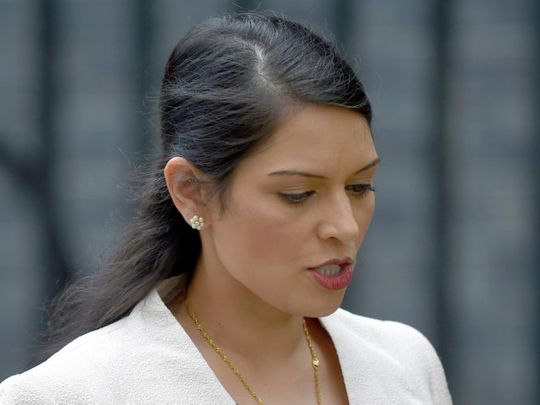
A lot of successful diplomacy is about ambiguity, nuance and turning blind eyes. So is a lot of failed diplomacy: When the ambiguity is not consensual, the nuance is missing, and mistakes or misjudgements are exposed to the cold hard glare of reality. Accidents, of course, happen, but the latest misadventures in the United Kingdom look embarrassingly avoidable.
Britain’s international development secretary’s busman’s holiday in Israel is the first problem. It is hard to believe that anyone, least of all Priti Patel herself, would think that combining a holiday with — it now turns out — 12, yes, 12 professional meetings was a particularly good idea.
So was this, as some appear to believe, an attempted assertion of departmental autonomy — by the Department for International Development (Dfid) against perceived encroachments by the Foreign Office? Was it just a reflection of over-eagerness by a rookie minister — as her statement suggested. Could it really be that she was unaware that all officials are supposed to be accompanied even to unofficial meetings by nice safe pairs of diplomatic hands? And had she, or had she not, informed the Foreign Office? Her grovelling apology places her in the wrong on all counts. Maybe, maybe not.
At least — as per the information to date — she paid for the trip herself, so there would appear to be no question of misuse of public funds. Then again, with so many meetings on the schedule, including with the Israeli Prime Minister Benjamin Netanyahu himself, why should she have paid? Or is Britain’s foreign outreach so strapped for cash, that ministers are now required, where possible, to combine business and pleasure? Whatever the rights and wrongs of this trip, none of it reflects well on the workings of government, least of all against the current fetid backdrop of Brexit and sex.
Boris Johnson, Britain’s Foreign Secretary, when he appeared before the Commons Foreign Affairs Committee, was asked what he was doing to secure the release of Nazanin Zaghari-Ratcliffe — a dual British-Iranian national detained in Tehran’s notorious Evin prison on undisclosed charges — Johnson said airily that she had been “simply teaching people journalism”. As a journalist himself, Johnson surely knows that there are many countries, Iran being one, where teaching and/or practising journalism can come with potentially grave complications.
Worse, in so saying, he deviated not only from the consistent British script — that Zaghari-Ratcliffe was in Iran for nothing more dubious than a holiday with her family — but from the truth, that, as stressed by her bosses, her job at the Thomson Reuters Foundation entails neither practising nor teaching journalism. Johnson, it would appear, made perhaps the same mistake as the Iranian prosecutors in inferring the nature of her work from her affiliation.
From there, it took the Iranian authorities less than 48 hours to haul Zaghari-Ratcliffe back into court and threaten her with five more years, in addition to her current five-year sentence. Understandably, her husband and campaigners demanded that Johnson issue a retraction. Already frustrated by what they see as the Foreign Office’s distinctly half-hearted approach to her plight, the British foreign secretary had with one careless remark seemed to confirm Iranian suspicions. It remains to be seen what, if anything, can be salvaged from this wreckage.
Zaghari-Ratcliffe is separated from her daughter, who is now three and living in Tehran with grandparents. Her husband cannot get a visa to visit her, and the Foreign Office — always warier, it seems, than their American or French counterparts about going in to bat for dual nationals — have stuck with their habitual softly-softly ways, which often look little different from doing nothing.
There have been suspicions, but no more, that there is more to Zaghari-Ratcliffe’s plight than has been told — that perhaps the Iranians are holding her as a de facto hostage, say, in the hope of securing some deal, or advantage from, the British. The Ratcliffes’ member of parliament, Tulip Seddiq, has tentatively canvassed the possibility. But the truth could be more prosaic.
The Foreign Office has long had a higher regard for itself than was perhaps deserved. Others, including some of Britain’s (still) European partners can be both more agile and more effective, especially where prisoners or hostages are concerned. While the UK always defends its refusal to pay ransoms, it tends also to shun publicity, even where — as here — there is a clear humanitarian imperative: A divided family and a small child. Now, though, it is not just Foreign Office tactics that may be blamed for Zaghari-Ratcliffe’s continued imprisonment, but incautious words from the Johnson himself.
All in all, it has not been a great year for UK diplomacy. There was the offer, since downgraded, of a state visit to United States President Donald Trump, and Johnson’s own on-off, now apparently on again, trip to Moscow. Now, the Foreign and Commonwealth Office’s running rivalry with Dfid has been brought mercilessly into the open; some under-the-radar diplomacy with Israel has been exposed, and — thanks to a foolish throwaway remark from Britain’s top diplomat — a British citizen could find her time in an Iranian prison doubled.
All this poses the question — is the distraction of Brexit leaving the UK’s other foreign efforts perilously thin, or is it worse? Has the UK perhaps just lost that Rolls-Royce diplomatic touch?
— Guardian News & Media Ltd
Mary Dejevsky is a writer and broadcaster. She is a former foreign correspondent in Moscow, Paris and Washington.












